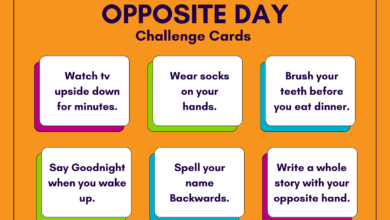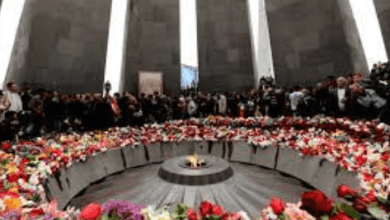Each year on Holocaust Remembrance Day, we remember the victims of one of history’s darkest events and honor their lives with a solemn day of reflection and acknowledgment. Discover its origins, learn why it’s important to remember, and consider how this somber day can be used to build bridges between people of different backgrounds and faiths.
Introduction: Significance of remembering the Holocaust
Holocaust Remembrance Day, also known as International Holocaust Remembrance Day, is an annual remembrance observed on January 27th. It celebrates the liberation of the Auschwitz-Birkenau concentration camp by Soviet forces in 1945 and serves as a reminder of the crimes done during the Holocaust.
Read Also: Poppy Remembrance Day
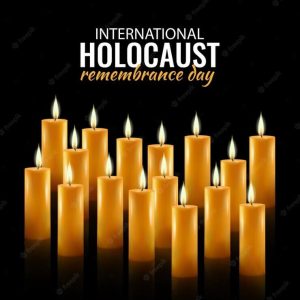
The Holocaust, also known as the Shoah, was a genocide committed in Germany by the Nazi dictatorship during World War II. It was distinguished by the methodical annihilation of millions of people, including but not limited to Jews, Romani people, homosexuals, handicapped persons, and political dissidents. The Holocaust killed about six million Jews, as well as countless other victims.
Remembering the Holocaust is important for a variety of reasons. It is a chance to pay respect to the victims and survivors of this awful tragedy, as well as their bravery and strength in the face of unspeakable tragedies. Remembering the Holocaust also serves as a warning of the perils of bigotry, prejudice, and intolerance, as well as the significance of opposing such ideas. It is a call to action for a more fair and compassionate society in which all people are treated with dignity and respect. Finally, commemorating the Holocaust is one method to guarantee that such a heinous act never happens again.
History of the Holocaust: Overview of the events leading up to the Holocaust
The Holocaust, also known as the Shoah, was the systematic slaughter of millions of people by the Nazi dictatorship in Germany during World War II, including but not limited to Jews, Romani people, homosexuals, handicapped persons, and political dissidents. The Holocaust is regarded as one of the darkest and most horrific episodes in human history, and its ramifications may still be felt today.
The events leading up to the Holocaust began in the early 1930s with the emergence of Adolf Hitler and the Nazi Party in Germany. Hitler and the Nazis enacted a slew of anti-Jewish and other minority-group legislation and regulations, notably the Nuremberg Laws of 1935, which deprived Jews of their citizenship and civil rights. The Holocaust began in earnest with the Nazi invasion of Poland in 1939 and swiftly extended to other nations as the Nazi authority seized additional territory.
Read Also: Michael Jackson Birth Anniversary
The Holocaust’s atrocities are almost too numerous to list, but among the most well-known are the systematic extermination of millions of Jews in concentration camps, death camps, and gas chambers; the use of slave labor; the mass murder of Romani people and disabled people; medical experimentation on prisoners; and the torture and abuse of countless victims.
The Holocaust killed about six million Jews, as well as countless other victims. The Holocaust had a terrible impact on Jewish communities across the world, eradicating whole families and villages. The Holocaust had far-reaching effects on the rest of the world because it represented a low moment in human history and served as a warning about the perils of prejudice and intolerance.
The importance of remembering the Holocaust: The need to honor the victims and survivors of the Holocaust
Remembering the Holocaust is critical for a variety of reasons. Recognizing the past is necessary for understanding the present and moving ahead on a constructive path. By remembering the Holocaust, we may obtain a better knowledge of the history and circumstances that led to such a terrible catastrophe, as well as learn from previous mistakes.
Education is also important in averting future genocides. We may better grasp the risks of bigotry, discrimination, and intolerance by learning about the Holocaust and working to create a more equitable and compassionate society. Individuals, particularly young people, must learn about the Holocaust in order to grasp the historical backdrop and the need of standing up to prejudice and injustice.
Read Also: Human Rights Day Wishes, Messages, Quotes, Greetings, Slogans
Honoring Holocaust victims and survivors is also an essential part of commemorating this awful event. The Holocaust victims and survivors faced unspeakable tragedies and suffering, and it is crucial to recognize and honor their courage and strength. Remembering the Holocaust is a means to commemorate their memory while also acknowledging the influence their experiences had on the globe. It is also a chance to demonstrate solidarity with the victims and survivors who are still alive today and to let them know that their experiences will not be forgotten. Finally, commemorating the Holocaust is one method to guarantee that such a heinous act never happens again.
How to observe Holocaust Remembrance Day: Ways to educate oneself about the Holocaust
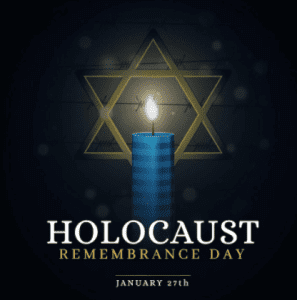
There are several methods to commemorate Holocaust Remembrance Day, also known as International Holocaust Remembrance Day, which is observed on January 27th each year.
On this day, the following events and ceremonies take place:
- Memorial services and rituals may include the burning of candles, the laying of wreaths, or the reading of victims’ names.
- Educational presentations and lectures about the Holocaust’s history.
- Holocaust-related film screenings and book talks.
- Exhibitions and performances in memory of the victims and survivors.
- Marches and vigils in support of the victims and survivors.
There are also other opportunities to learn more about the Holocaust. Some ideas are as follows:
- Reading Holocaust-related books and articles, such as survivor memoirs or historical descriptions of the events.
- Visiting Holocaust museums or educational centers, which frequently feature Holocaust exhibits and programs.
- Watching Holocaust-related documentaries or flicks.
- Participating in Holocaust education programs or workshops.
There are also other individual and community-based initiatives that may be conducted to remember Holocaust victims and survivors. Among the suggestions are:
- Donating to organizations that provide assistance to Holocaust survivors and their families.
- Donating time or resources to groups that fight prejudice and intolerance.
- Participating in Holocaust education programs or workshops and sharing what you’ve learned with others.
- Writing letters or sending cards of encouragement to Holocaust survivors or their families.
- Displaying a flag or other sign in memory of Holocaust victims and survivors.
- Supporting projects that promote understanding and peace among various groups of people.
Holocaust Remembrance Day Slogan 2024
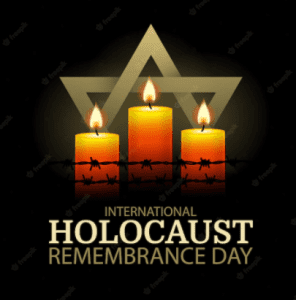
“Honoring the victims and surviving, remembering the history, and striving towards a better future.”
“Never, ever forget, never again.”
“Remembering the Holocaust, fighting prejudice and intolerance”
“Honoring the victims’ and survivors’ fortitude and perseverance”
“It is necessary to remember the past in order to develop a better tomorrow.”
The ongoing relevance of Holocaust Remembrance Day: The need for continued education and remembrance to prevent future genocides
Holocaust Remembrance Day is an annual commemoration of the crimes done during the Holocaust and the significance of commemorating this awful event. The fact that Holocaust Remembrance Day is still acknowledged and honored across the world, more than 75 years after the conclusion of World War II, demonstrates its enduring importance.
The importance of continued education and remembrance cannot be overstated. By learning about the Holocaust and remembering its victims and survivors, we can better understand the dangers of hatred, prejudice, and intolerance, and work towards creating a more just and compassionate world. It is also important to recognize that the Holocaust was not an isolated event, but rather one of many genocides that have occurred throughout history. By remembering the Holocaust, we can honor the victims and survivors of these tragedies and work towards preventing future genocides from occurring.
Finally, Holocaust Remembrance Day is an essential chance to pay respect to Holocaust victims and survivors, learn about this awful event, and fight for a more just and compassionate society. It serves as a reminder of the risks of prejudice and intolerance, as well as the need of opposing such views. We can memorialize the victims and survivors of the Holocaust while also working to avoid future genocides by remembering it and continuing to educate ourselves and others about its history.


